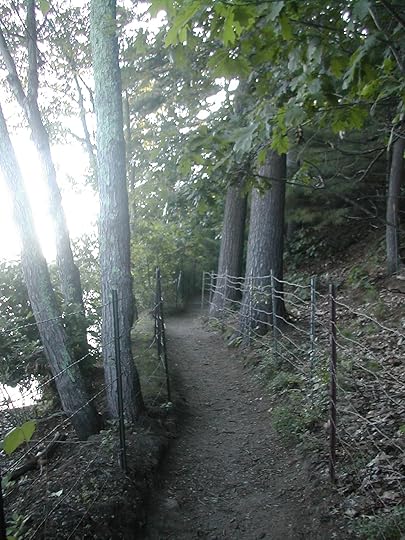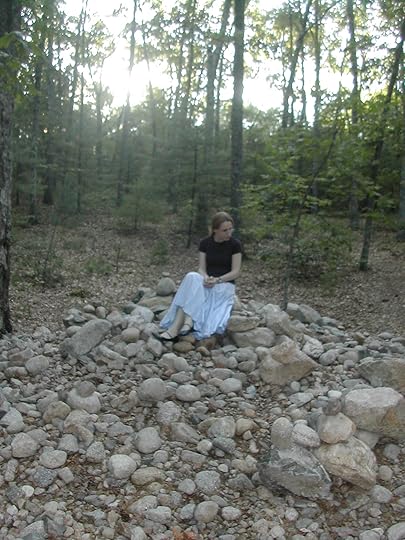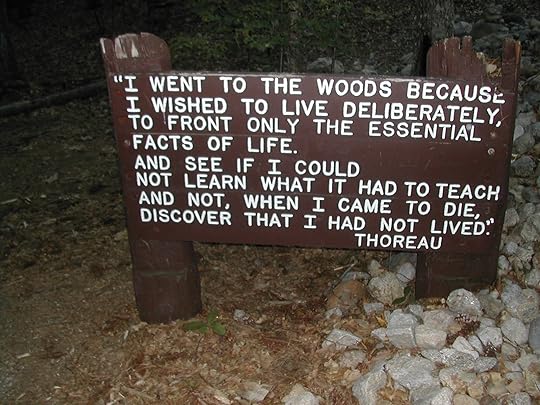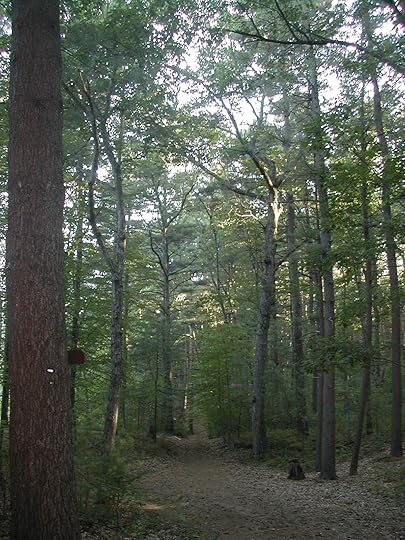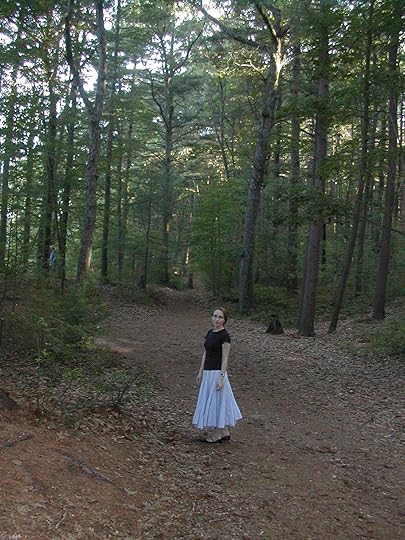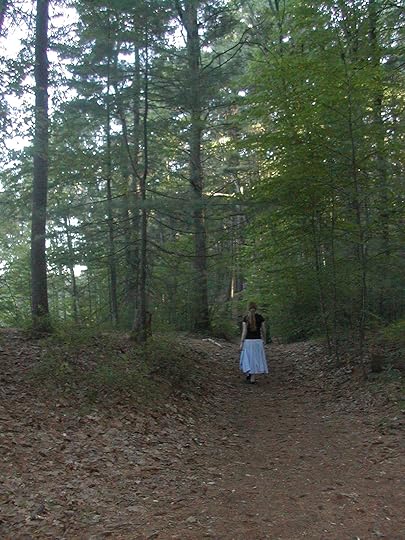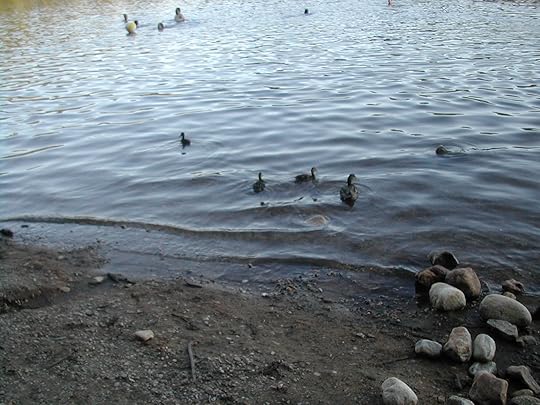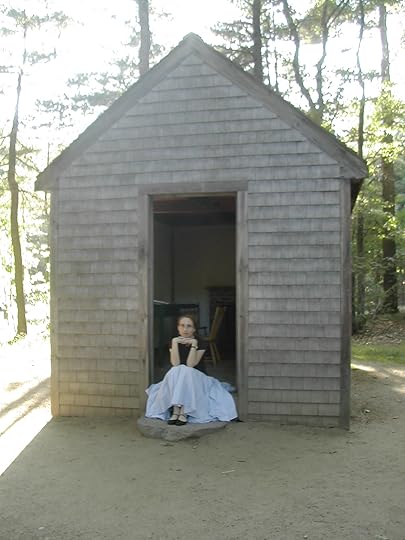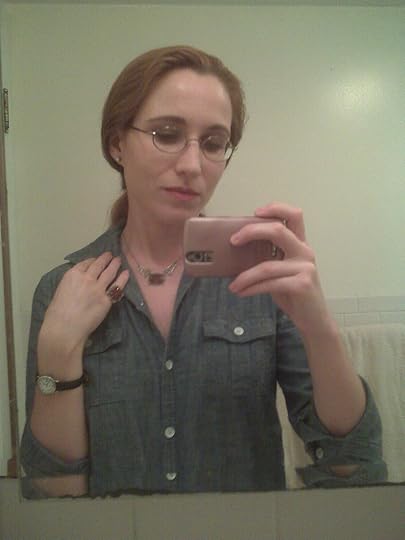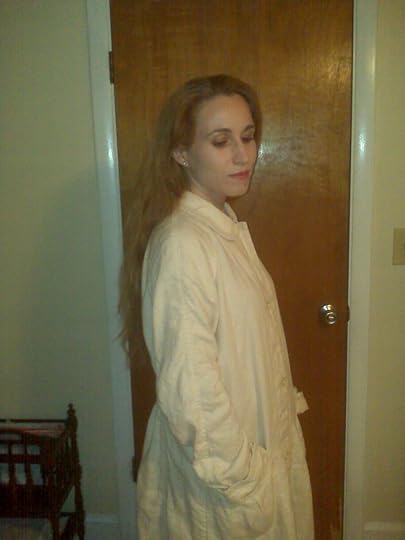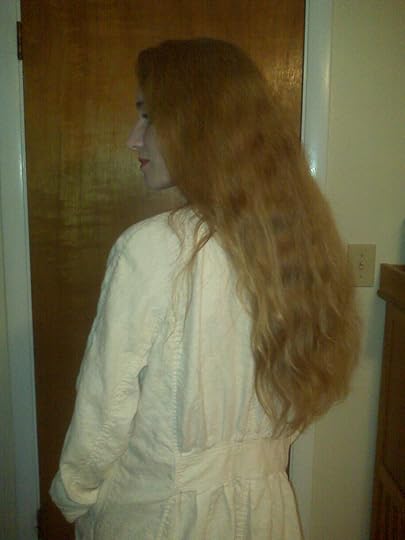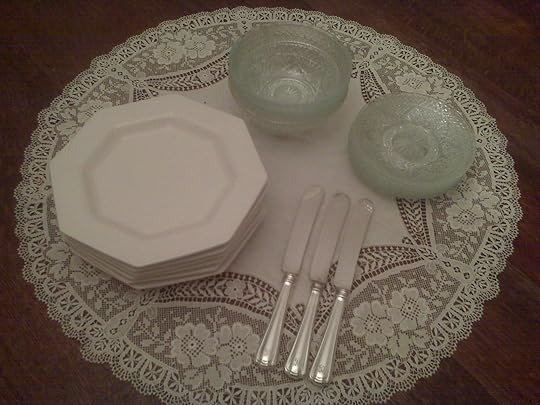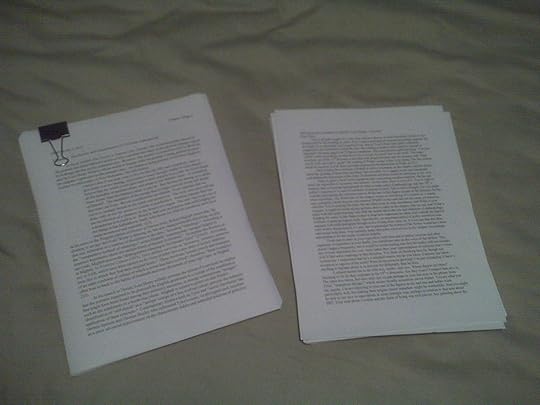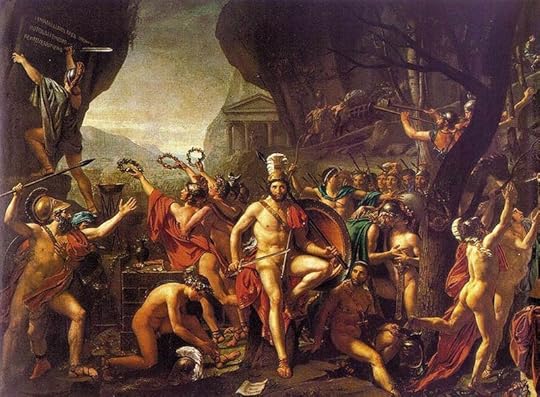Theodora Goss's Blog, page 54
July 14, 2011
My Readercon Readings
Status report: Yesterday and today, I'm preparing for Readercon. That means I'm not working on the dissertation, but I may be able to take Sunday off from the convention and work on it then. The goal is still to have the entire dissertation revised and put together by the end of the month, before I go to New York and Asheville.
Tonight, I'll be going to the Naked Cities reading at Porter Square Books to see Ellen Datlow, Jeff Ford, Kit Reed, Matthew Kressel, John Crowley, Ellen Kushner, and Caitlín R. Kiernan read from their stories. One of the nice things about living in Boston is that you can go to readings like that on a regular basis. Everyone's in town for Readercon, which makes it easy to gather what is a rather amazing group. I can't wait to see them all. (And I've never seen John Crowley read before. He's one of my favorite writers, one of the few writers I'll read just about anything by, so I'm really looking forward to hearing him.)
But about my own readings.
As you know, I'm participating in four readings at Readercon. (Four! How did that happen?)
And I have a bit of an announcement, which is this:
At my own reading (my own half-hour slot reading), I'm going to be reading from the Secret Project. As you may already know if you clicked the link, the Secret Project is a book called The Thorn and the Blossom, which is coming out in January from Quirk Books. That's all I can tell you about it right now. But I asked my editor and got permission to share more information at the Readercon reading. So if you come to my reading, you'll be the very first to hear about the book, and of course to hear part of it. I can't wait to read from it for the first time.
Here's my reading schedule for Readercon:
Friday:
1:30 p.m. My Reading!
I'll be reading from The Thorn and the Blossom.
4:00 p.m. Mythic Delirium/Goblin Fruit Reading
I'll be reading "The Gentleman."
Saturday:
3:00 p.m. Rhysling Award Poetry Slan
I'll be reading "Ravens."
7:00 p.m. Wold Newton Reading Extravaganza
I'll be reading a section from The Rose in Twelve Petals called "The Hound" to the music of Brain Slattery.
The Rose in Twelve Petals was published back in 2001, a decade ago. It was my first published story. You can find it in my short story collection, but if you haven't read it (and most of you probably haven't), I thought I would at least give you the section I'm reading here. It's a retelling of the Sleeping Beauty story from various perspectives. This is one of them:
The Hound
In a hundred years, only one creature comes to the palace: a hound whose coat is matted with dust. Along his back the hair has come out in tufts, exposing a mass of sores. He lopes unevenly: on one of his forepaws, the inner toes have been crushed.
He has run from a city reduced to stone skeletons and drifting piles of ash, dodging tanks, mortar fire, the rifles of farmers desperate for food. For weeks now, he has been loping along the dusty roads. When rain comes, he has curled himself under a tree. Afterward, he has drunk from puddles, then loped along again with mud drying in the hollows of his paws. Sometimes he has left the road and tried to catch rabbits in the fields, but his damaged paw prevents him from running quickly enough. He has smelled them in their burrows beneath the summer grasses, beneath the poppies and cornflowers, tantalizing, inaccessible.
This morning he has smelled something different, pungent, like spoiled meat: the smell of enchantment. He has left the road and entered the forest, finding his way through a tangle of briars. He has come to the village, loped up its cobbled streets and through the gates of the palace. His claws click on its stone floor.
What does he smell? A fragrance, drifting, indistinct, remembered from when he was a pup: bacon. There, through that doorway. He lopes into the Great Hall, where breakfast waits in chafing dishes. The eggs are still firm, their yolks plump and yellow, their whites delicately fried. Sausages sit in their own grease. The toast is crisp.
He leaves a streak of egg yolk and sausage grease on the tablecloth, which has remained pristine for half a century, and falls asleep in the Queen Dowager's drawing room, in a square of sunlight that has not faded the baroque carpet.
He lives happily ever after. Someone has to. As summer passes, he wanders through the palace gardens, digging in the flower beds and trying to catch the sleeping fish that float in the ornamental pools. One day he urinates on the side of the tower, from which the dark smell emanates, to show his disapproval. When he is hungry he eats from the side of beef hanging in the larder, the sausage and eggs remaining on the breakfast table, or the mice sleeping beneath the harpsichord. In autumn, he chases the leaves falling red and yellow over the lawns and manages to pull a lobster from the kitchen tank, although his teeth can barely crack its hard shell. He never figures out how to extract the canary from its cage. When winter comes, the stone floor sends an ache through his damaged paw, and he sleeps in the King's bed, under velvet covers.
When summer comes again, he is too old to run about the garden. He lies in the Queen Dowager's drawing room and dreams of being a pup, of warm hands and a voice that whispered "What a beautiful dog," and that magical thing called a ball. He dies, his stomach still full with the last of the poached eggs. A proper fairy tale should, perhaps, end here.








July 12, 2011
Preparing for Readercon
Status report: Today, the revised abstract was approved by my first and second readers. So that's done. Next it goes to the Director of Graduate Studies and Department Chair for signatures, and then up to the Dean for final approval. All that should happen in August. In the meantime, I will be completing revisions to the dissertation. Today I revised Chapter 3, although I still have to add a footnote. Also correct some citations, but I may not have time for that until Thursday. By the end of the week, I should have Chapters 1 and 3 completely revised, in preparation for the final set of revisions when I put the entire dissertation together.
Are these statue reports incredibly boring? They probably are, but you know what? They're helping me. So I'm going to keep doing them, as a way of reminding myself where I am, what I need to do next. Also, to be honest, the dissertation is the most important thing in my life right now, and this blog reflects what's going on in my life, so I can't help writing about it. I have a series of piles on my desk now: completed abstract, revised Chapter 1, two copies of Chapter 2 with comments from my two readers, revised Chapter 3, and the bibliography. If I can get Chapters 1 and 3 completely revised by Readercon, I can focus on Chapter 2 and the introduction for two weeks and put everything together by the end of the month.
August will be for final revisions, once my readers take one last look at the dissertation. And then by the end of the month it will go to the committee. I was originally hoping to defend in September, but this schedule pushes it back to October. Still, that's not bad, is it? It means that finally, finally, the dissertation will be done. This is the hardest thing I've done my whole life. I don't think anything I do after this will be as hard. Certainly writing novels won't be.
But I'm sure you're tired of hearing about it, so why don't I write about Readercon? Here is my final schedule (which has changed from the previous version):
Friday:
11:00 a.m. Rudyard Kipling, Fantasist and Modernist
Dozois, Feeley, Goss, Schweitzer, Taaffe
12:00 Classic Fiction: Howl's Moving Castle
Cooney, Files, Goss, Link, Taaffe
1:30 p.m. My Reading!
(I'll tell you what I'm going to read in the next few days.)
4:00 p.m. Mythic Delirium/Goblin Fruit Reading
(I'll be reading a poem, not sure which yet.)
I will, of course, be at the Meet the Prose party on Friday night.
Saturday:
3:00 p.m. Rhysling Award Poetry Slan
(I'll be reading "Ravens," which is nominated for a Rhysling.)
7:00 p.m. Wold Newton Reading Extravaganza
(I'll be reading to the music of Brain Slattery. Still deciding on the story!)
9:00 p.m. There's No Homelike Place
Doyle, Goss, Janssen, Purdom, Warren
Sunday:
I have nothing actually scheduled for Sunday, but I'll probably be there for the Interstitial Arts Foundation Town Meeting at 10:00 a.m.
Today, I drove to the library to pick up two volumes of the science fiction and fantasy of Rudyard Kipling, just to make sure I was ready for the Kipling panel. And I have to reread Howl's Moving Castle for that panel. So I have my bedtime reading cut out for me, for the next few days. I also have two stories and a poem to choose.
In other words, I'm in the process of preparing for Readercon.
I'm going to do my best this year, and you probably won't see much difference between me at Readercon this year and other years. But I'll be tired and distracted. Just bear with me, all right? I'm in the middle of the most difficult part of the most difficult year. I keep telling myself that it will end, and that once it does, things will be better. I hope I'm right.
In the meantime, if you're coming to Readercon, I look forward to seeing you there. And come to my reading! I don't know what I'll be reading yet, but it will be something forthcoming – meaning something that no one has heard before. So you'll be the first to hear it.








July 11, 2011
The Stair in Her Hair
Status report: I revised the abstract and sent it to my first and second readers. Tonight, I need to make a few final corrections to Chapter 1, and it will be done, at least for now. I'll go over it again when I put the entire dissertation together. Tomorrow, I'll start working on Chapter 3. I should be able to finish that fairly quickly, before Readercon starts on Thursday.
But all day today I've felt – I'm not sure how to describe it. Anxious, distracted, sad? All of those, but deeper than they imply. On days like this, it doesn't make sense to write a blog post, because I don't know what to write about. Even revising my abstract took forever. I had forgotten that Readercon was this week, and I wish I had another week to prepare. It will be a sad Readercon, I think. I won't be able to focus on it the way I usually do.
Because I can't give you anything beautiful of my own today, I'm going to give you something beautiful created by other people. This is a song called "Stairs in Her Hair." It was written by Amal El-Mohtar and inspired by the painting in the video, which is "There's a Stair in Her Hair" by Rima Staines. I first heard it at Wiscon, where Amal sang it at the party for Catherynne Valente's The Girl Who Circumnavigated Fairyland In A Ship Of Her Own Making. She wrote it to accompany Cat's story "Voice Like a Hole," which is in the new Bordertown anthology, Welcome to Bordertown. Here is the song:

Come to think of it, that does remind me of something I can write about. Yesterday, there was an interview with Steph Swainston in The Independent. She's canceling a book deal, training to become a chemistry teacher. According to the article (and I know only what the article says, not what she actually said or meant, which can be quite different), she wants to get back to "real life."
We all have different reasons for writing and ways of writing. But I think my perspective is also quite different from hers. I've been a teacher, although at a university, for a decade now. Teaching is no less or more real than writing. It's just – different. What I value so much about writing is what I see happening with the song above. Amal wrote it, inspired by a painting and in connection with a story. And now it's up on YouTube so I can post it here. There's so much variety and creativity in the writing life. So many things you can do. And there's a great deal of repetition in teaching. A great deal of stress, certainly as much as writing a book a year and publicizing it. What I love about my own writing life is its creativity and variety. I get to do so many things! Write stories, essays, poems. Connect with people through readings and blog posts. I love doing those things, and they're very real to me.
I don't know what Readercon will be like for me, this year. I think it will be difficult. There will be so much to be anxious about, so much to distract me. But I'm going to try to enjoy myself. I'm going to try to remind myself that this is the most difficult time, and that it will end. And there will be something better on the other side.








July 10, 2011
Going to Walden
Status report: a terrible night. Sometimes I do all right with caffeine, so I forget the times that I don't. Yesterday afternoon, I stopped in the Japanese bakery in downtown Lexington and bought myself an espresso jelly, which is basically espresso as a cold jell with whipped cream and a coffee bean on top. It's absolutely delicious, but by midnight I realized that I was not tired at all, and by five in the morning I realized that I might as well just get up because I wasn't going to sleep. So I had breakfast. After some oatmeal and orange juice, I was finally able to get to sleep, and when I woke up I felt better. But that's the last time I'm going to have an espresso jelly, no matter how much I love it. I just can't handle the caffeine.
When I finally woke up again, I was able to work for a couple of hours, and I finished the revisions to Chapter 1. Tonight and tomorrow, I'm planning on revising the abstract, and then it's on to Chapter 2 and more work on the introduction. I think I'll be working on the introduction for the next three weeks. I initially thought I would be able to write it separately, but there's too much I need to borrow from and coordinate with the other chapters. I need to write it during the revision process. But I feel better about that process today. It's going all right.
By six o'clock I was tired of working, so I went to Walden Pond. I took some pictures, because I know that many of you have read Henry David Thoreau but have never been to Walden. So I'm going to show you what it looks like. First, I have to tell you: the most surprising thing about Walden is that you expect it to be a sort of sanctuary, a place kept sacrosanct, and it's not. At one end of the pond is a public beach that has been there since at least the 1940s, and wherever you walk, you can hear the distant shouts of bathers. I haven't taken pictures of the public beach, and it's not large, but know that it's there.
First we come to a replica of Thoreau's cabin. The place his cabin was located is actually across a road, much closer to the pond. But I'm glad they built a replica, because it's nice to be able to visualize where he lived. "Simplify, simplify," he said. The cabin is indeed as simple as possible.
"As you simplify your life, the laws of the universe will be simpler; solitude will not be solitude, poverty will not be poverty, nor weakness weakness." I think there's a great deal of truth in that. Simplifying your life allows you to redefine other parts of it as well. Solitude, poverty, and weakness are in part (although certainly not in whole) what we say they are, what we define them to be. I need to simplify too, Thoreau. To redefine. And I'm trying.
I wonder how closely the furniture in the cabin matches what he actually owned? I love everything in the cabin. I love the colors, the shapes, the peace that seems to inhabit it. Thoreau wrote, "I had three chairs in my house; one for solitude, two for friendship, three for society." I would want more than three chairs, but I find the simplicity of the cabin restful. (I would also want a bathroom.)
"Do what you love. Know your own bone; gnaw at it, bury it, unearth it, and gnaw it still." I feel as though that's what I'm doing, nowadays. Although I'm tired of gnawing the dissertation bone specifically. It's getting very dry, that bone. I'd rather gnaw on a novel. Well, that will happen, almost soon enough.
When I realized I was going to post pictures of myself as well, I thought, I should at least have tried to look moderately presentable. Because what you see here is Dissertation Dora, in glasses and old clothes, looking tired. I came straight from typing to Walden. "I say beware of all enterprises that require new clothes, and not rather a new wearer of clothes." I don't know, I should probably have changed.
"There are moments when all anxiety and stated toil are becalmed in the infinite leisure and repose of nature." After looking at the replica cabin, let's cross the road and walk around the pond. Somehow, when I get out into the natural world, I do feel that: the anxiety and sense of toil go away, for a little while. Especially around water.
It should really be called Walden Lake. As you can see, it's quite large, and wooded all around. And all around there are paths, close to the water. "Pursue some path, however narrow and crooked, in which you can walk with love and reverence." The paths around the lake are relatively narrow, although I'm not sure how reverent I was feeling. You always need to approach Thoreau with a sense of humor.
"Every man casts a shadow; not his body only, but his imperfectly mingled spirit. This is his grief. Let him turn which way he will, it falls opposite to the sun; short at noon, long at eve. Did you never see it?" I included that quotation because here I was walking under the shadows of the trees. I'm not sure what other applicability it has, except that whatever shadow is inside me, I carry it with me always, even to a place as peaceful as this.
At one point, there is a bridge. On one side of the bridge is a small extension of the pond with water lilies, almost a separate pond. On the other side is the main pond, with open water. I didn't take a photograph of the bridge because there were people on it. "Success usually comes to those who are too busy to be looking for it." I guess that's some consolation, isn't it? I've been very, very busy lately.
"Great men, unknown to their generation, have their fame among the great who have preceded them, and all true worldly fame subsides from their high estimate beyond the stars." I wonder to what extent Thoreau was thinking of himself when he wrote that? It's obvious, from the way he pontificates, that he thought he was one of the great men of his generation. He was right of course, but that's also why you need to approach him with a sense of humor. You can't be entirely reverent. This is where his cabin was located.
To the left is a large pile of stones. People have been coming for many years and leaving stones in Thoreau's memory. "The Artist is he who detects and applies the law from observation of the works of Genius, whether of man or Nature. The Artisan is he who merely applies the rules which others have detected." Because he is a Romantic, he has to say things like that. Otherwise, he'll lose his Poetic License.
Of course I left a stone. Wouldn't you? You'd want to be able to say you did. "How vain it is to sit down to write when you have not stood up to live." I sat down on the pile of stones. Honestly, I'd stand up to live if I had more time. Right now, it's all about the writing – the dissertation writing. But I'll start living again as soon as I can. Really.
Of course there is the requisite Thoreau quotation, on a sign by the rock pile. What is Thoreau to us nowadays? A source of quotations that we think we understand out of context. But I do want to live deliberately, to learn what life has to teach so when I come to die, I will know that I have lived: fully, completely. I check myself sometimes. I ask myself, am I living today? And if I'm not, I ask myself, why not? And what can I do to experience something – beauty, joy, grandeur? And then sometimes I look at the moon, and sometimes I listen to music. And sometimes I dance.
The trees around the pond are incredibly tall. I wonder if they were as tall when Thoreau was alive? "I know of no more encouraging fact than the unquestionable ability of man to elevate his life by conscious endeavor." I am consciously endeavoring, right? Although I'd have to ask Thoreau what specifically he means by elevate. I mean, Bronson Alcott tried to elevate his life by consciously endeavoring not to wear wool. That works a lot better after the invention of acrylic fleece.
Thoreau talks a lot about solitude. "I have never found a companion that was so companionable as solitude. We are for the most part more lonely when we go abroad among men than when we stay in our chambers. A man thinking or working is always alone, let him be where he will." I have to admit, I am often more lonely in crowds than I am when actually alone. But I think Walden is the sort of place where you should bring a friend. You need someone to whom you can make snarky comments.
"If a man walks in the woods for love of them half of each day, he is in danger of being regarded as a loafer. But if he spends his days as a speculator, shearing off those woods and making the earth bald before her time, he is deemed an industrious and enterprising citizen." I guess I have to count myself among the loafers, then. I would like to be able to walk in woods, more frequently than I do now. If I had a piece of land with woods, and a pond, and some space for a cabin and a garden, I wonder how often I would leave it?
We have taken a detour to see where Thoreau's cabin was located. Now we follow the path back to the lake. Thoreau said, "A lake is the landscape's most beautiful and expressive feature. It is Earth's eye; looking into which the beholder measures the depth of his own nature." I have to admit, I always find myself happiest around water, just as of all sounds, I most love birdsong or the chirping of crickets. Or the hooting of an owl, in the early morning.
You can see the bathers above. It's difficult to take a photograph of the lake without some of them getting into the frame. As you go around the pond, there are regular intervals at which large stones have been set into the banks, as steps. They go down to the lake, and almost each set of steps had its bathers, gathered on them. I have always loved the idea of stone steps going down into the water, I'm not sure why. Thoreau also wrote, "The cost of a thing is the amount of what I will call life which is required to be exchanged for it, immediately or in the long run." Sometimes I do think about how much of my life I'm exchanging for something. That's why I try to buy only things that are beautiful or useful, that are worth a part of my life.
On the way back, I saw a family of ducks. I was surprised by how close the mother duck let me get to the ducklings. "Nature puts no question and answers none which we mortals ask. She has long ago taken her resolution." That's what I find so restful about nature. It is so completely itself. So completely resolved.
"In my afternoon walk I would fain forget all my morning occupations and my obligations to society." And I kind of did, actually. At least, after walking around at Walden, I felt much, much better about myself and my work. Thanks, Thoreau. Honestly, sometimes you sound like a parody of yourself, but that's probably not your fault. It's probably the fault of a hundred dorm posters with sayings that are supposed to be inspirational, but by which you meant something more complex, and more politically motivated, and more revolutionary, than we realize.
"Our moments of inspiration are not lost though we have no particular poem to show for them; for those experiences have left an indelible impression, and we are ever and anon reminded of them." I'm going to remember Walden and draw from it in some way. I find that all the important things I do affect my life and my writing, which are intertwined anyway. And I'm at a point in my life when I don't really bother doing things that are not important. I don't have the inclination or time.
But going to Walden is one of the important things. Like a pilgrimage. With, don't forget, a sense of humor.








July 9, 2011
Sufficient Unto the Day
Status report: I didn't exactly take the day off today, but I accomplished much less than I had intended to. It's because I'm so tired.
I get to the end of a day working on the dissertation, and honestly, I don't know what to write here. It's as though my brain has stopped working. As though it's on overload.
My life is in such a liminal place right now, and I'm not good at the liminal, I think. I want to feel the ground under my feet, and right now it feels as though I'm falling through space, not quite knowing when I will land. Not quite knowing where. But on a sticky note above my desk, I've written two things:
What can you do?
What can you do today?
Meaning, know what you have control over and what you don't. Do what you can do, when you can. And that's all I can do, for now. So tonight, I'm going to try to finish revising Chapter 1, and anything I don't finish tonight, I'll finish tomorrow, so I can start Chapter 2 next week.
(The title of this post is of course from the Bible: "Sufficient unto the day is the evil thereof." Which I would rephrase as "Sufficient onto the day is the worry thereof, and the work thereof as well.")
There are a couple of things I can write about. The first is that today, I had a very small adventure. I went back to my favorite antiques store to look at that necklace again. And there was a table I had wanted to buy ($45). I went ahead and bought it. Here it is, at home, with a green wedgewood jasperware box on top and a silver tea chest that is a family piece on the shelf. (I need to have that tea chest repaired. There's a silver shop on Newbury Street that has given me an estimate. I've just never had the time to actually take it in. But I will, eventually.)
And then I thought and thought about the necklace, because it came with a ring and I didn't really want the ring. It's a pretty piece, but I don't usually wear jewelry that large, and it's a size 5, so it only fits my pinky finger. It has marcasites in it, which means it probably can't be resized. It's clear that the two were not originally a set: someone must simply have paired them because of the similarity in design. Finally, after seeing me hesitating, the store owner lowered the price to what it would have been if I were just buying the necklace ($50) and threw in the ring. He thought it would be too difficult to sell alone. So now I have both.
They're silver, with an agate surrounded by marcasites. The necklace is very deco.
And then I went into Lexington and checked some movies out of the library, so between the library and Netflix DVDs I had a choice of the last two episodes of last season's True Blood, Dorothy Sayers' Have His Carcass and Gaudy Night, Terry Pratchett's Hogfather, and Immortal Beloved (about the secret love of Ludwig van Beethoven). And I thought, what strange tastes I have! (I watched the True Blood episodes while eating dinner.)
That's about all I have for you today. I have to get back to writing about Krao, a seven-year-old girl who was brought to England from "Indochina" (I'm not sure what country, that's how she's identified in the advertisements) and exhibited at the Westminster Aquarium in London as living proof of Darwin's theory of evolution. She was advertised as the "Missing Link" because she had fine, dark hair covering her body. She grew up on the show circuit, one of the more famous freaks (and yes, that is the technical term) exhibited at that time. She eventually joined Barnum and Bailey, and then Ringling Brothers.
The problem is, I'm writing about what she signified to Victorian society, how she was presented as living proof of evolutionary theory. How she was both classified and resisted classification. But I'm a writer, so of course what I think about, all the while, is who she was as a person. What it must have been like to be brought to England at such a young age, exhibited in front of hundreds of people. Was she frightened? Did she have time to play? Were there other children for her to play with? When she grew up, she married the man who had originally exhibited her. Did she feel coerced? Did she truly love him? What would love mean in that context? To what extent did she have the power and freedom to direct her own life?
And I think about what a strange thing life is, how we have to create the best lives for ourselves, the ones most full of joy and creativity and adventure, no matter what circumstances we're born into. No matter how difficult those circumstances are. Compared to so many of the people who have come before me, so many people living today, I'm one of the fortunate ones of the earth, with the power to create the life I want for myself.
That starts today. And tomorrow, it will start today as well. And the next day, and the next.








July 8, 2011
Finding the Romance
Status report: Today, I'm working on revising Chapter 1 and the Introduction. I took four long paragraphs out of Chapter 1. They were paragraphs about the history of gothic literature, as I see it, and they really should go in the Introduction, so that's where I put them. And then I added notes for several paragraphs on Krao, a freak show performer from what was then Indonesia who was advertised as a Darwinian "missing link." (She probably had a mild case of hypertrichosis? It's difficult to tell from the advertising material, which of course is as sensational as possible.) The information on freak shows is fascinating, and it reminds me why scholarship is important: we need to understand what happened in the past, so we can learn from it in the present. But I'm trying to stay focused on the task at hand, which is of course making revisions to Chapter 1 and drafting the Introduction. I'd like to keep the Introduction to 20 pages, but we'll see. At any rate, it's going fairly well, although I get so tired of the work. Physically tired of sitting and reading and typing. It's exhausting.
And before I forget, I should tell you that my short story "The Rapid Advance of Sorrow" has been reprinted on the Apex Magazine website, here. It's a story I wrote at the Clarion writing workshop, many years ago. If you haven't read it before, take a look!
In the afternoon, I took a break and went to my favorite antiques store, where I looked at a necklace I've had my eye on. Should I get it? I'm not sure. I'll probably decide tomorrow.
But that reminds me, I promised to post pictures of the dresses I found yesterday. One of them is actually a coat rather than a dress, sort of a coat dress. Here is the first one, an April Cornell:
It fits perfectly, and it's light and long and floaty. I love the way it feels on. And here is the coat dress, a J.Jill:
The only problem with the coat dress is that it's a small, and you can tell it's actually too large for me. But I loved it too much not to buy it. (I mean, it was $7.) I haven't ironed it, so it's all wrinkly. But it has the nicest back detail:
I tried to take full-length pictures of both, but the pictures didn't come out right, I'm not sure why. They come down to just above my ankles. And they inspired the title to this post, which refers to finding the romance in life.
The word "romance" can mean so many things. It can refer to romantic love, of course. It can also refer to a certain kind of story, a story with adventure in it. Maybe even magic, like the old Arthurian romances. And it can refer to a style, an attitude, a way of looking at life. I suppose by the word "romance" I mean all those things. I've said before that the stories we tell about our lives create our reality. Of course, our lives have an underlying reality that we might not be able to change: we might get sick, for example. But we can tell different stories about our sickness.
And we can tell different types of stories. I think the type of story I prefer to tell is a romance, and perhaps that's why I like buying long, floaty dresses with roses all over them. (Although the photograph readers have clicked on most often, on this blog, is one of me in a mini-skirt. Which makes me smile in a wry sort of way.) It may also be why I think of my dissertation as a battle, with me as Leonidas (in a long, floaty, rosy dress, which is a strange image, isn't it?).
I like beautiful things for their own sake, but I also like to create the appropriate setting for the story I'm telling myself, about my life. For example, I never posted a picture of the magazine stand I bought, several weeks ago:
Isn't it pretty? At the moment it's holding my copies of Locus and the notebook in which I'm writing the YA novel. You could call it my writing stand. (I think it was $28).
I know this probably sounds silly, but why not make your life romantic? Why not surround yourself with things that make you feel like a heroine? Such as a long linen coat or a pottery bowl full of pine cones? You have to have furniture, you have to buy clothes. Why not make them part of the adventure?
Even writing a dissertation can be an adventure, but it takes a lot of work to make a dissertation adventurous: quoting poetry, comparing yourself to Spartan leaders, all that stuff.
Honestly, this is the dull, difficult part: revising, revising, revising. To get myself through it, I have to tell myself stories. I have to feel as though my life is not going to be this dull and difficult, not permanently, not even for all that long. I have to find the romance, even in this. (And just wait! What comes after is going to be so much more interesting. I promise.)








July 7, 2011
Q is for Quality
Status report: This morning, I read about the Great Exhibition of 1851. At noon, I had a conference call about the Secret Project, which I still can't discuss. This afternoon, I worked on the introduction, making notes on the Great Exhibition and on Victorian freak shows. Then I revised Chapter 1. I need to do more work on Chapter 1 tomorrow, but I'm hoping to have it completely revised either tomorrow or Saturday. Then, I drove into the city. I needed to go to the university library, but I also stopped by my favorite thrift store and picked up some pretty things. Here they are:
The octagonal plates are from one of my favorite ironstone patterns, by Independence Ironstone. You can find it, every once in a while. There was quite a lot of it made. And I like the octagons. The knives are actually from an antique store I went to yesterday, not from the thrift store, but I thought I would show you those as well. They're sliver plate, and they have a monogram: G. I thought that was significant, so I bought them ($10 for three). I also bought two of the pressed glass bowls today. I had bought the other bowls and the matching plates at another thrift store several weeks ago. As soon as I saw these two, I knew they were the same pattern. One of them still has traces of gilding on the rim, but that will come off in the dishwasher, eventually. I dislike gilding.
Don't these, the cream-colored plates, the gleaming silver, the glass bowls that would be so perfect for strawberries, make you think of a summer party?
I also bought two dresses, one an April Cornell dress with pink roses, the other a J.Jill coat-dress in cream-colored linen. Unfortunately, I washed them together, assuming the pink dress was color-fast, and got some pink dye on the linen, so there I was, scrubbing it with stain remover, hoping the dye would come out. It did, and thank goodness linen doesn't take dye well. I don't think I could have gotten it out of cotton. I always assume that clothes I buy in thrift stores are color-fast because they've been washed before, but evidently the previous owner of this particular dress followed the care instructions, which say to dry-clean only. Who does that? I mean, I never dry-clean anything. It's expensive and horrible for the environment. Anything natural, like wool or silk, can be hand-washed in cold water. And anything so unnatural that it can only be dry-cleaned, you shouldn't be wearing anyway. I may post pictures of the dresses tomorrow.
And then I drove back home. Driving the Pathfinder on the highway always makes me feel – what's the word? It's twenty years old and drives like a truck (it's a stick, of course), but in my hands it purrs like a kitten. I drove with the windows down and my hair whipping around me, blasting Baroque music, toward the sunset. The grass on the median strip had just been mown, and all the way home, I could smell freshly cut grass. I thought, when I'm eighty years old, I'm going to have white hair down to my waist, and people are going to think I'm the Queen of the Fairies, and I'm going to be the coolest thing you ever saw.
And now I'm back to work.
What was I going to write about today? Oh yes, quality. When I was in college, I read an article in Vogue about the idea of Q. I still remember that article, but I tried to google Q recently, and got nothing except James Bond and Star Trek references. In that article, Q stood for quality. The idea was that items either had Q or not.
What does Q depend on? The item has to be functional. A wooden bookshelf has Q to the extent that it fulfills its function, which is holding books. But an item also has to have substance. A bookshelf made of solid pine has Q, no matter how cheap it is, whereas a bookshelf made of particleboard does not, no matter how expensive. And it has to have honesty. A particleboard bookshelf with wood veneer does not have Q, no matter how nice the veneer. It's pretending. An item with Q does not pretend to be something other than what it is. Q has nothing to do with how expensive something is. A plastic bracelet that does not pretend to be anything other than plastic can have Q.
Functional, substantial, honest. Those are the qualities necessary for Q. I'm basing these criteria on what I remember from the article, but I'm also elaborating, because I remember very little about it, really. Just the basic concept.
I think the things I bought today have Q. The substantial ironstone plates, the silver-plated knives, the glass bowls. (Yes, the knives are silver plate, but they don't pretend to be silver. And they're completely functional: I put my silver plate in the dishwasher, whereas I would never do that to my silver, which is always hand-washed.)
This concept has been important to me because I've tried to make sure that whatever I buy has Q, whether it's a piece of furniture, or clothing, or even food. I'm going to link to some companies that make products with Q. They make some of my recent favorites. The first is Pacifica, which makes candles and perfumes that smell gorgeous. I particularly like the Persian Rose and French Lilac. The second is LÄRABAR, which makes bars from only a few ingredients. They are delicious, especially the Cherry Pie. The third is Earth Science, which makes some of my favorite creams and moisturizers. It's important to choose items with Q. They work better, last longer. And having items with Q in your life improves the Q of your life as a whole. It gives your life a higher quality.
It's important to surround yourself with items that are functional, substantial, and honest. Beauty comes out of those qualities. At least it does for me.








July 6, 2011
The Magician's Book
Status report: I've very tired. I drafted my abstract, and now I'm working on writing my introduction. I'm also in the middle of revising the first chapter. I'm doing quite a lot of reading, making sure I have all the background information I need. Mostly about the Great Exhibition of 1851 and Victorian freak shows. The freak shows are important because the people who were displayed were considered outside contemporary categories, and that's what I'm writing about in the literature of the time as well. I'm writing about the other, the "monster" as socially defined. After all, my dissertation is called The Monster in the Mirror. But the information about freak shows is interesting as well (and yes, that is the term academics use, the official term), because when Mary finds Justine and Catherine, they're working in a circus sideshow. Catherine is the Cat Girl, and Justine is the Giantess. The books I'm reading have reproductions of the sorts of pamphlets that were used at the time, and it's good to get a sense for the language. And I'm tired, and I haven't posted for two days, I know. They've just been those sorts of days.
Here, by the way, is Dissertation Dora:
I still haven't had time to get my hair cut, and it's long enough now that I can just knot it at the back of my neck, and it stays. But I thought I'd better include a picture in which I look at least slightly less severe:
But today I want to write about something other than my dissertation, although it is in a way related to it.
When I was writing my Folkroots column on Narnia, I didn't have a chance to finish Laura Miller's The Magician's Book. So I'm reading it now, slowly, before I go to sleep each night. And it's wonderful. Just as examples, I'm going to quote several passages I particularly liked.
"Narnia is a place so thrilling that you can finally stop imagining you're somewhere better. It is the place where adventures are transformed from something you read about in books to something you actually get to do."
That's where you want to go, isn't it? The place where you don't wish you were somewhere else? Honestly, I think that most places I've been in my life, I wished I were elsewhere. There were only a few place where I thought, yes, this is it.
"'Adventure,' then, is what might otherwise be called a hardship if it were attempted in a different spirit. Turning a difficult task or a perilous journey into an adventure is largely a matter of telling yourself the right story about it, which is one thing that Lewis's child characters have learned from reading 'the right books.' This is surely one of the oldest tasks that stories are called upon to perform."
I think that's absolutely true. We tell ourselves stories about the world, and the stories we tell create a large part, although not all, of our reality. But reality is in large part how we perceive it. So we need to tell the right kinds of stories.
"The lives Lewis and Tolkien led might appear sheltered at first glance, but in this respect they endured more than almost anyone in my own circle ever will; middle-class American intellectuals in recent years have seldom gone to war. Tolkien, in a preface to The Lord of the Rings, wrote that by 1918, when he turned twenty-six, all but one of his closest friends had been killed."
I confess – I had thought of Lewis' and Tolkien's lives as relatively sheltered. And yet they weren't, were they? Miller points out that at the time Lewis was describing those feasts in Narnia, food was rationed. She quotes from letters Lewis wrote to friends in America, fervently thanking them for sending food.
"Lewis dreaded war (especially as his brother became a career officer in the Royal Army Service Corps and was called to active service during World War II), but the literature he studied showed it to be a continuing fact of human existence. He firmly believed that sometimes war was necessary. Religion explains why – sometimes we must be willing to sacrifice ourselves for a greater good – but stories show us how."
And we're back to stories again. But stories do teach us how to deal with hardship and pain. That's how we learn, from stories. Which is why stories have been so important throughout human history.
"People read criticism of work they already know well because they hope to expand their understanding, perhaps even to relive the experience through someone else. Great critics show us new dimensions of a book or a film, but they also articulate what it feels like to encounter the work, a sensation may of us can't adequately capture on our own."
I think that based on that criteria, Miller is a great critic. She's showing me so much about the Narnia books that I either didn't know or knew and didn't particularly think about. She's putting things in context.
"If literary writing has any distinguishing characteristics, it's that the more you look at it the more you see, and the more you see the more you want to go on looking. It invites a plurality of interpretations."
Yes, I believe this. And it's the sort of literature I try to write, despite the fact that I write fantasy. There have been times when I've been in places where there was very little to read. And in those places I ended up reading books like Rosamunde Pilcher's The Shell Seekers or John Grisham's The Partner (which I have to admit I skimmed). I remember feeling, after I'd read them, as though I'd seen a slick, sophisticated performance. I never wanted to read the books again. I was left with a sense of deep disappointment and wasted time. The books hadn't given me anything. They hadn't left anything with me.
What does this have to do with my dissertation? In my last post, I quoted from some academic writing. Miller's writing is nothing like that. It's clear, smart, informative. It speaks to everyone, not to a small group that has specifically been educated to read it. And that's the sort of writing I want to do. I want to be able to write as clearly as she does, to be as insightful about literature.
I'm working on my dissertation, and it's somewhere between Miller and the academic writing I quoted. But what I want to do after it's done is write in a way that everyone will be able to read and understand.
I'm seriously thinking of writing Miller fan mail.








July 3, 2011
Me and Leonidas
"The Spartans on the sea-wet rock sat down and combed their hair."
That's the last line of one of my favorite poems, "The Oracles" by A.E. Houseman. Do you know what it's about? The Battle of Thermopylae, actually. I mean the line, not the whole poem. The story goes that before attacking the Spartans, who had agreed to hold the pass at Thermopylae, King Xerxes gave them four days to retreat. He was certain that such a small force would retreat before the might of the Persian army. But on the fourth day, there they still were, coming their hair and wrestling. This was their way of preparing to either conquer or die. On the fifth day, the battle began.
King Leonidas had a particular reason for not retreating. The Oracle at Delphi had told him that either Sparta would lose its king, or it would fall to the Persians. So, he chose to sacrifice himself for Sparta.
Why am I writing about Leonidas? Because on Friday, I met the last of my deadlines. I don't have any more deadlines until the end of August. That means I have two months to focus on my dissertation. (And write the YA novel, when I'm so tired of my dissertation that I can't focus on it any more.) So what did I do yesterday, to prepare myself for battle?
Let's be clear, first of all, that it is battle. Academic writing doesn't come naturally to me. I was thinking about this yesterday when I read the following sentence in one of the critical analyses I need to read for the dissertation:
"The impresario that stages this patriarchal drama is called 'culture,' itself the production of an emergent capitalist European society; the conflictual structures generated by its imbalances of power are consistently articulated through points of tension and forms of difference that are then superimposed upon each other: class, gender and race are circulated promiscuously and crossed with each other, transformed into mutually defining metaphors that mutate within intricate webs of surreptitious cultural values that are then internalized by those whom they define."
You know what I thought when I read that sentence? I'll articulate you! Surreptitiously and promiscuously. Who writes like that? Academics, that's who. And I can't do it. I can barely stand to read it. So that's going to be a significant problem for my academic career, isn't it? My dissertation doesn't sound anything like that, of course. But in order to work on it, I have to get back into the correct mindset. Which means that I need to work on it every day, need to have it in my head every day. And that's hard.
It's a different kind of writing than my creative writing. I think I can both revise the dissertation and work on the YA novel, but we'll have to see how it goes.
Yesterday, I prepared myself for battle. I did not comb my hair or wrestle, not being a Spartan. What I did instead was clean my room. I rearranged my physical space, putting my writing projects away on a shelf, placing my chapters prominently on my desk. Everything printed out, ready to work on. Want to see?
This is Chapter 1 and the comments I need to incorporate, on my coverlet.
These are Chapters 2 and 3 with comments, on my desk. And the binder in which I keep all the chapters.
This is a sticky note I put above my other desk, the one with the laptop on it. It says "Don't Panic." Anther valuable lesson learned from The Hitchhiker's Guide to the Galaxy.
So, just in case you were thinking of asking me to do something that's due within the next two months: don't. I won't be able to do it. I'm going to be working on my dissertation, otherwise known as battling the Persians. And I hope that I'm not going to perish, like poor Leonidas. But you know what Spartan mothers tell their sons: come back with your shield or on it. And that's what I'm planning to do.
By the way, here is Leonidas at Thermopylae, by Jacques-Louis David. At my dissertation defense, I'm planning on wearing clothes.
And here is that poem I like so much, just because I think everyone should read it.
The Oracles
by A.E. Houseman
'Tis mute, the word they went to hear on high Dodona mountain
When winds were in the oakenshaws and all the cauldrons tolled,
And mute's the midland navel-stone beside the singing fountain,
And echoes list to silence now where gods told lies of old.
I took my question to the shrine that has not ceased from speaking,
The heart within, that tells the truth and tells it twice as plain;
And from the cave of oracles I heard the priestess shrieking
That she and I should surely die and never live again.
Oh priestess, what you cry is clear, and sound good sense I think it;
But let the screaming echoes rest, and froth your mouth no more.
'Tis true there's better boose than brine, but he that drowns must drink it;
And oh, my lass, the news is news that men have heard before.
The King with half the East at heel is marched from lands of morning;
Their fighters drink the rivers up, their shafts benight the air,
And he that stands will die for nought, and home there's no returning.
The Spartans on the sea-wet rock sat down and combed their hair.








July 2, 2011
Hemingway Was Right
So, The New York Times is good for something after all.
This morning I read an op-ed piece by A.E. Hotchner called "Hemingway, Hounded by the Feds." Hotchner was Hemingway's friend for more than a decade. He adapted many of Hemingway's stories and novels for television and film, and they traveled all over the world together. He's written several books about Hemingway.
The piece begins,
"Early one morning, 50 years ago today, while his wife, Mary, slept upstairs, Ernest Hemingway went into the vestibule of his Ketchum, Idaho, house, selected his favorite shotgun from the rack, inserted shells into its chambers and ended his life."
Hotchner writes about the last year of Hemingway's life, when he fell into depression and paranoia. He describes a particular trip to see Hemingway in Idaho. Hemingway had been through a difficult time, particularly editing an article on bullfighting for Life Magazine. Hotchner had helped him with it, assuming he was only tired and would be his old self again soon.
"In November I went out West for our annual pheasant shoot and realized how wrong I was. When Ernest and our friend Duke MacMullen met my train at Shoshone, Idaho, for the drive to Ketchum, we did not stop at the bar opposite the station as we usually did because Ernest was anxious to get on the road. I asked why the hurry.
'The feds.'
'What?'
'They tailed us all the way. Ask Duke.'
'Well . . . there was a car back of us out of Hailey.'
'Why are F.B.I. agents pursuing you?' I asked.
'It's the worst hell. The goddamnedest hell. They've bugged everything. That's why we're using Duke's car. Mine's bugged. Everything's bugged. Can't use the phone. Mail intercepted.'"
Sounds like mental illness, doesn't it? That's certainly what everyone assumed. Hemingway may have assumed it himself. He was eventually admitted to a psychiatric hospital.
"On Nov. 30 he was registered under an assumed name in the psychiatric section of St. Mary's Hospital in Rochester, Minn., where, during December, he was given 11 electric shock treatments.
In January he called me from outside his room. He sounded in control, but his voice held a heartiness that didn't belong there and his delusions had not changed or diminished. His room was bugged, and the phone was tapped. He suspected that one of the interns was a fed."
Hemingway repeatedly tried to commit suicide. Eventually, he succeeded. Hotchner mourns what happened to his friend.
"This man, who had stood his ground against charging water buffaloes, who had flown missions over Germany, who had refused to accept the prevailing style of writing but, enduring rejection and poverty, had insisted on writing in his own unique way, this man, my deepest friend, was afraid — afraid that the F.B.I. was after him, that his body was disintegrating, that his friends had turned on him, that living was no longer an option."
It's a terrible story, a terribly sad story. But you have to get to the end of the article. It goes like this.
"Decades later, in response to a Freedom of Information petition, the F.B.I. released its Hemingway file. It revealed that beginning in the 1940s J. Edgar Hoover had placed Ernest under surveillance because he was suspicious of Ernest's activities in Cuba. Over the following years, agents filed reports on him and tapped his phones. The surveillance continued all through his confinement at St. Mary's Hospital. It is likely that the phone outside his room was tapped after all.
In the years since, I have tried to reconcile Ernest's fear of the F.B.I., which I regretfully misjudged, with the reality of the F.B.I. file. I now believe he truly sensed the surveillance, and that it substantially contributed to his anguish and his suicide."
You see, it's not a sad story anymore. It's a story about a man who saw the reality of his life and the world around him more clearly than anyone else. A man who knew. It's a story that makes me angry.
And it makes me think the following. If you're a writer and you think what you're doing is not that important, remember that all totalitarian societies attempt to control their writers. I know this first-hand, remember. I was born in a society were books were censored, where letters were intercepted and read, where the government listened to telephone calls. Where citizens were under constant surveillance. I understand why, living in this society, you might think writing is not all that important. Why it doesn't much matter what you do. But writing is not a game, not a hobby, not a job, not even a career. It's a calling. Next time you're absorbed in whether or not writers should self-publish, or the future of the publishing industry, or any of the questions that seem to get so much attention, think about what it is we're doing, as writers. Telling the truth, as we see it. Telling the world what it is, what it could become, what it should be. That's what we are called to do.
And J. Edgar Hoover, I wish I believed in Hell so I could tell you to rot in it.
Requiescat in pace, Ernest.









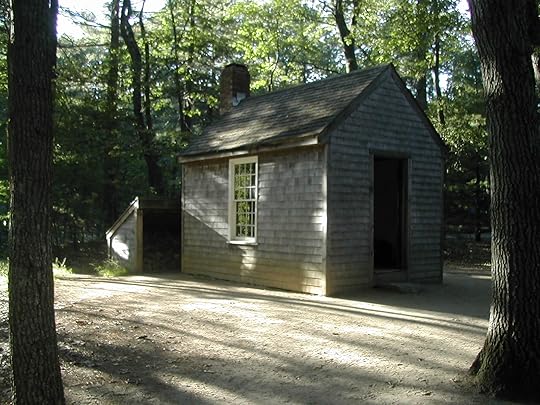
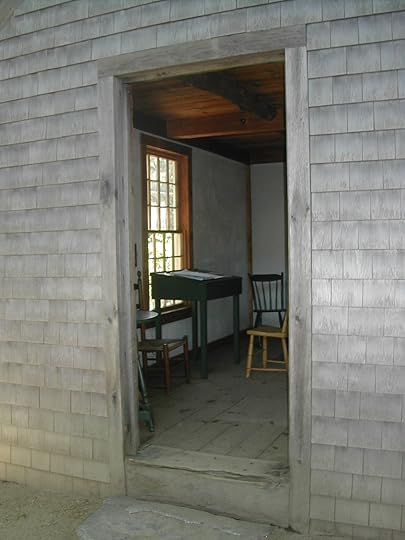
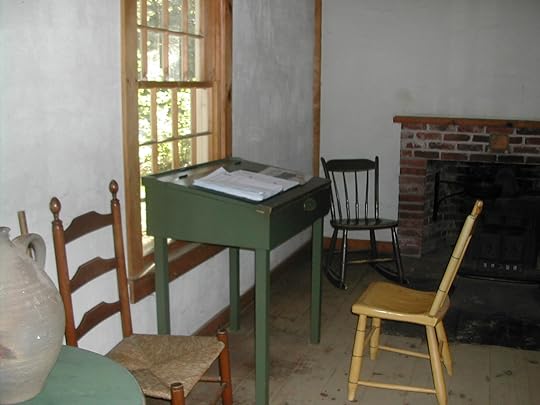 "
"


